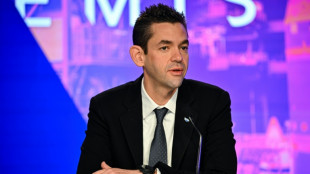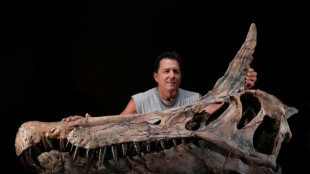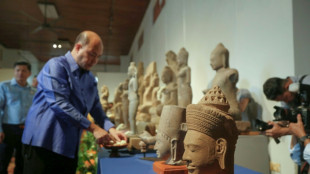
-
 Barca's Yamal nets hat-trick in Villarreal romp, Atletico go third
Barca's Yamal nets hat-trick in Villarreal romp, Atletico go third
-
Trump says Khamenei is dead after Israel, US attack Iran

-
 Iran's Khamenei: ruthless revolutionary atop Islamic republic
Iran's Khamenei: ruthless revolutionary atop Islamic republic
-
Inter continue Scudetto march after Champions League humbling

-
 Questions cloud Trump's case for war against Iran
Questions cloud Trump's case for war against Iran
-
Latest developments in US, Israel strikes on Iran

-
 Fears of Mideast war as US-Iran conflict flares
Fears of Mideast war as US-Iran conflict flares
-
Guardiola expects short absence for injured Haaland

-
 Liverpool's set play transformation a return to 'normal' for Slot
Liverpool's set play transformation a return to 'normal' for Slot
-
Man City win to close on Arsenal as Liverpool hit five

-
 Kane bags brace as Bayern end Dortmund's title hopes
Kane bags brace as Bayern end Dortmund's title hopes
-
Semenyo sinks Leeds as Man City close gap on Arsenal

-
 Last-gasp Lukaku saves Napoli's blushes at rock-bottom Verona
Last-gasp Lukaku saves Napoli's blushes at rock-bottom Verona
-
Could the US-Israel war on Iran drag on?

-
 Iranians abroad jittery but jubilant at US, Israeli strikes
Iranians abroad jittery but jubilant at US, Israeli strikes
-
Pakistan 'have underperformed' says Agha after T20 World Cup exit

-
 Under-strength Toulouse overpower Montauban in Top 14
Under-strength Toulouse overpower Montauban in Top 14
-
Vietnam AI law takes effect, first in Southeast Asia

-
 Brazil's Lula visits flood zone as death toll from landslides hits 70
Brazil's Lula visits flood zone as death toll from landslides hits 70
-
New Zealand into T20 World Cup semis as Sri Lanka avoid big Pakistan loss

-
 Medvedev wins Dubai title as Griekspoor withdraws
Medvedev wins Dubai title as Griekspoor withdraws
-
First Yamal hat-trick helps Liga leaders Barcelona beat Villarreal

-
 Liverpool hit five past West Ham, Haaland-less City face Leeds test
Liverpool hit five past West Ham, Haaland-less City face Leeds test
-
Van der Poel romps to cobbled classic win

-
 Republicans back Trump, Democrats attack 'illegal' Iran war
Republicans back Trump, Democrats attack 'illegal' Iran war
-
Madonna is surprise attraction at Dolce & Gabbana Milan show
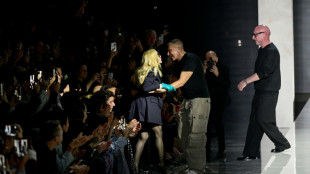
-
 Farhan keeps Pakistan hopes alive as they post 212-8 against Sri Lanka
Farhan keeps Pakistan hopes alive as they post 212-8 against Sri Lanka
-
Afghanistan says civilians killed in Pakistan air strikes

-
 Tug of war: how US presidents battle Congress for military powers
Tug of war: how US presidents battle Congress for military powers
-
Residents flee as Iran missiles stun peaceful Gulf cities

-
 Streets empty and shops close as US strikes confirm Iranian fears
Streets empty and shops close as US strikes confirm Iranian fears
-
Israelis shelter underground as Iran fires missiles
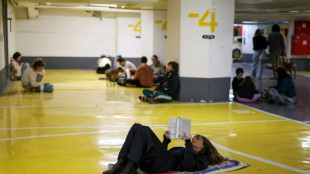
-
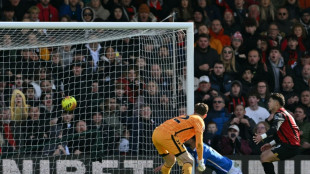 Bournemouth held by Sunderland in blow to European bid
Bournemouth held by Sunderland in blow to European bid
-
VAR expanded to include second bookings and corners for World Cup

-
 Iranians in Istanbul jittery but jubilant at US, Israeli strikes
Iranians in Istanbul jittery but jubilant at US, Israeli strikes
-
Congo-Brazzaville president vows to keep power as campaign kicks off
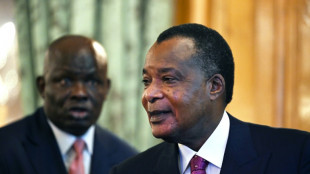
-
 US, Israel launch strikes on Iran, Tehran hits back across region
US, Israel launch strikes on Iran, Tehran hits back across region
-
Germany's Aicher wins women's super-G in Soldeu

-
 Fight against terror: Trump threatens Tehran's mullahs
Fight against terror: Trump threatens Tehran's mullahs
-
US and Israel launch strikes on Iran, explosions reported across region

-
 Iran's Khamenei: ruthless revolutionary at apex of Islamic republic
Iran's Khamenei: ruthless revolutionary at apex of Islamic republic
-
In Iran attack, Trump seeks what he foreswore -- regime change

-
 Climate change forces facelift for Michelangelo masterpiece
Climate change forces facelift for Michelangelo masterpiece
-
Trump says US aims to destroy Iran's military, topple government

-
 Acosta wins season-opening MotoGP sprint after Marquez penalty
Acosta wins season-opening MotoGP sprint after Marquez penalty
-
US and Israel launch strikes against Iran

-
 Afghanistan says Pakistan fighter jet down as cross-border strikes flare
Afghanistan says Pakistan fighter jet down as cross-border strikes flare
-
Kerr says only '85 percent' fit for Women's Asian Cup

-
 Messi's Inter Miami to visit White House: US media
Messi's Inter Miami to visit White House: US media
-
Thunder beat Nuggets in overtime on Gilgeous-Alexander's return


Experts point out how TV's Dr House often got it wrong
He's the maverick medic who loved to confound the medical establishment with his brilliant, unorthodox diagnoses.
But Dr Gregory House, the misanthropic genius who was the star of the long-running "House" television series, got an awful lot wrong himself, Croatian doctors claim.
From a neurologist at work on the wrong end of a patient by performing a colonoscopy, or an MRI scan done by a physician who is clearly not a radiologist, Croatian researchers have pulled the American series up on its medical accuracy in a paper published this month.
Denis Cerimagic, a professor at Dubrovnik University, and two fellow neurologists -- all big fans of the series -- listed 77 errors after analysing all 177 episodes of the show, which ran from 2004 to 2012.
"We focused on the diagnoses of main cases, reality of clinical practice presentation and detection of medical errors," Cerimagic told AFP.
He and his peers -- Goran Ivkic and Ervina Bilic -- broke the mistakes down into five categories including misuses of medical terminology, misinformation and simple weirdness -- something which the show's anti-hero, played by British star Hugh Laurie, possessed in abundance.
- That limp -
They included the use of mercury thermometers -- which had long given way to digital ones -- the term heart attack and cardiac arrest being used interchangeably when they are not the same, and that vitamin B12 deficiency can be corrected with just one injection.
Nor is there a universal chemotherapy for all types of malignant tumours, as one episode suggested.
But arguably the biggest error of all is that Laurie -- whose character's genius for deduction comes from the misdiagnosis that left him with a limp and chronic pain -- uses his cane on the wrong side.
The stick should be carried on his unaffected side, Cerimagic said, though he understood why the actor had done it because "it's more effective to see the pronounced limp on the screen".
Their research also found medical procedures being done by specialists who had no business being there, like an infectologist performing an autopsy.
At times the series also stretched reality beyond breaking point, with the findings of complex laboratory tests done in just a few hours. And doctors rarely turn detective and take it upon themselves to enter patients' homes to look for environmental causes of illnesses.
Not to mention Dr House's unethical behaviour -- "Brain tumour, she's gonna die" the paper quoted him as saying -- and the character's opiates addiction.
The researchers say they may have missed other mistakes.
"We are neurologists while other medical specialists would certainly establish additional errors," Cerimagic added.
- Medical errors -
Whatever their criticisms, the researchers say that modern medical series are far better produced than in the past, thanks to medical advisors.
It is not like some 20 years ago when you had doctors looking at X-rays upside down, the neurologist said.
"Now only medical professionals can notice errors," Cerimagic said.
Despite its flaws, they thought the series could even be used to help train medical students.
"The focus could be on recognising medical errors in the context of individual episodes, adopting the teamwork concept and a multidisciplinary approach in diagnosis and treatment," Cerimagic said.
He said he and his colleagues were taken aback by the response to their paper "House M.D.: Between reality and fiction" -- which is not the first academic study to cast doubt on the good doctor and his methods.
"The idea was to make a scientific paper interesting not only to doctors but also to people without specific medical knowledge."
P.Martin--AMWN

